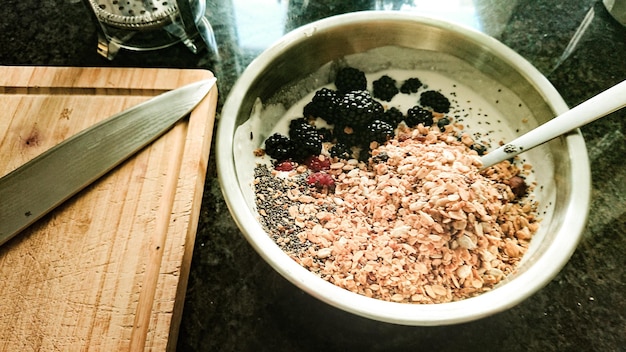2500 Calorie Meal Plan for 8-Week Muscle Gain

Achieving significant muscle gain within an 8-week timeframe necessitates a precisely engineered 2500-calorie meal plan, emphasizing a strategic balance of macronutrients and consistent nutritional support tailored for optimal hypertrophy.
Embarking on a journey to build muscle requires more than just dedicated gym sessions; nutrition plays a paramount role. Understanding How a 2500 Calorie Meal Plan Can Maximize Muscle Gain in 8 Weeks is crucial for anyone serious about transforming their physique and optimizing their strength. This isn’t merely about eating a lot; it’s about eating intelligently to fuel recovery, repair, and growth.
The Science Behind Muscle Hypertrophy and Caloric Intake
Muscle growth, or hypertrophy, is a complex biological process that demands a positive energy balance—meaning you consume more calories than you burn. This surplus provides the raw materials and energy reserves necessary for muscle protein synthesis to outpace breakdown. For many individuals aiming for significant gains, a 2500-calorie meal plan often serves as an effective starting point, offering a robust caloric foundation for sustained growth without excessive fat accumulation.
The delicate balance between calorie surplus and body composition is paramount. Too few calories, and your body lacks the resources to repair and build muscle tissue effectively. Too many, and the excess energy is stored as fat rather than being channeled primarily into muscle. Therefore, this specific caloric target seeks to optimize the anabolic environment, ensuring that the body is primed for muscle development while minimizing unwanted fat storage.
Understanding Energy Balance for Growth
Energy balance is the cornerstone of any effective muscle-building strategy. It dictates whether your body is in a state of anabolism (building) or catabolism (breaking down). For hypertrophy, a consistent and moderate caloric surplus is key. A 2500-calorie target provides a substantial energy reserve for strenuous workouts and the subsequent recovery processes, directly supporting protein synthesis.
- Caloric Surplus: Consuming more calories than expended creates the energy required for muscle repair and growth.
- Protein Synthesis: Adequate calories facilitate the amino acid uptake necessary for building new muscle proteins.
- Glycogen Stores: Sufficient caloric intake ensures glycogen reserves are full, powering intense training sessions.
Metabolic Rate and Individual Needs
While 2500 calories is a common and effective target for many, individual metabolic rates and activity levels play a significant role in determining precise caloric needs. Factors such as age, gender, body weight, current muscle mass, and daily activity significantly influence one’s Total Daily Energy Expenditure (TDEE). Therefore, this 2500-calorie plan serves as a robust baseline, which may require slight adjustments based on individual responses and progress.
Monitoring body weight and progress photos weekly helps in assessing if the intake is appropriate. If weight gain is too rapid and largely fat, a slight reduction might be needed. Conversely, if no significant weight or muscle gain occurs, a modest increase in calories may be warranted. This adaptive approach ensures the plan remains effective and personalized.
The goal is to maintain a steady, gradual increase in lean muscle mass. By understanding your body’s unique response to this caloric intake, you can fine-tune the plan to achieve optimal results over the 8-week period, maximizing the efficiency of muscle gain and minimizing undesired fat accumulation.
Crafting Your 2500-Calorie Macronutrient Blueprint
Beyond total calorie count, the distribution of macronutrients—proteins, carbohydrates, and fats—is critical for muscle synthesis and overall energy. A well-designed 2500-calorie meal plan prioritizes protein intake to support muscle repair, provides complex carbohydrates for sustained energy, and includes healthy fats for hormonal balance and essential functions. This strategic allocation ensures every calorie serves a purpose in your muscle-building journey.
The ratio of these macronutrients significantly impacts your body’s ability to recover from intense training sessions, fuel subsequent workouts, and ultimately, build lean muscle tissue. Neglecting any one of these components can hinder progress, making a balanced approach indispensable for maximizing gains within the 8-week timeframe.
Optimal Protein Intake for Muscle Repair
Protein is the cornerstone of muscle growth. It provides the amino acids necessary for muscle protein synthesis, repairing micro-tears caused by training, and building new muscle fibers. For a 2500-calorie plan aimed at muscle gain, aiming for approximately 0.8 to 1 gram of protein per pound of body weight is a generally accepted guideline. This translates to a substantial portion of your caloric intake, ensuring ample building blocks are available. Lean protein sources should be emphasized to avoid excessive saturated fat intake.
- Lean Meats: Chicken breast, turkey, lean beef.
- Fish: Salmon, tuna, cod.
- Dairy: Greek yogurt, cottage cheese, milk.
- Eggs: Whole eggs or egg whites.
- Plant-Based: Lentils, chickpeas, tofu, tempeh (for plant-based diets).
Carbohydrates: Fueling Performance and Recovery
Carbohydrates are your body’s primary energy source, essential for high-intensity training and replenishing muscle glycogen stores post-workout. Without adequate carbohydrates, protein may be used for energy rather than muscle repair, undermining your efforts. Focus on complex carbohydrates that provide sustained energy release and essential fiber. These should comprise a significant portion of your 2500-calorie intake, providing the energy necessary to push through challenging workouts.
Strategic timing of carbohydrate intake around workouts can further enhance performance and recovery, ensuring your muscles are primed for growth. This is particularly vital for the cumulative stress of an 8-week intense training cycle.

Healthy Fats: Essential for Hormonal Balance
Fats, often misunderstood, are vital for hormone production, nutrient absorption, and overall health. Healthy fats, particularly monounsaturated and polyunsaturated fats, support optimal testosterone levels, which are crucial for muscle growth. While protein and carbohydrates take precedence for energy and muscle building, fats provide a concentrated source of calories and support crucial bodily functions. Aim for approximately 20-30% of your total calories from healthy fat sources.
- Avocado: Rich in monounsaturated fats.
- Nuts and Seeds: Almonds, walnuts, chia seeds, flaxseeds.
- Olive Oil: Extra virgin olive oil for cooking and dressings.
- Fatty Fish: Salmon, mackerel (for omega-3 fatty acids).
Sample 2500-Calorie Meal Plan for a Week
Implementing a 2500-calorie meal plan effectively requires thoughtful planning and preparation. Here’s a sample daily breakdown designed to hit your macronutrient targets and provide a variety of nutrient-dense foods. This plan emphasizes whole, unprocessed foods to maximize nutrient intake and support sustainable muscle growth over an 8-week period. Consistency is key, so find foods you enjoy and can stick with.
This is a template, and individual preferences and dietary restrictions should always be taken into account. The goal is to illustrate how a 2500-calorie intake can be structured across different meals, ensuring a balanced distribution of macronutrients throughout the day to support continuous muscle protein synthesis and recovery.
Monday: Kickstarting Your Week
- Breakfast (500 calories): 1 cup (240g) Greek yogurt (plain, full-fat) with 1/2 cup (120g) mixed berries, 1/4 cup (25g) granola, and 1 scoop (25g) whey protein mixed in.
- Mid-morning Snack (300 calories): 1 medium apple with 2 tablespoons (32g) natural peanut butter.
- Lunch (700 calories): Large salad with 6 oz (170g) grilled chicken breast, 2 cups mixed greens, 1/2 cup (128g) chickpeas, 1/4 cup (25g) shredded cheese, and 2 tablespoons (30ml) olive oil-based dressing. Side of 1 cup (186g) cooked quinoa.
- Post-workout Snack (300 calories): post-workout shake with 2 scoops (50g) whey protein, 1 medium banana, and 1 cup (240ml) almond milk.
- Dinner (700 calories): 6 oz (170g) baked salmon, 1 large (200g) baked sweet potato, and 1.5 cups (240g) steamed broccoli.
Tuesday: Variety and Sustained Energy
- Breakfast (500 calories): 3 scrambled eggs with 1 cup (180g) cooked spinach, 1/2 cup (75g) black beans, and 2 slices (56g) whole-wheat toast with 1 tablespoon butter.
- Mid-morning Snack (300 calories): 1 cup (240g) cottage cheese with 1/2 cup (120g) pineapple chunks.
- Lunch (700 calories): Whole-wheat wrap with 5 oz (140g) lean ground turkey, 1/2 cup (120g) rice, lettuce, tomatoes, and low-fat cheese. Side of 1 cup (100g) baby carrots and 2 tablespoons (30ml) hummus.
- Post-workout Snack (300 calories): 1 cup (240g) Greek yogurt with 1/4 cup (25g) chopped walnuts.
- Dinner (700 calories): 6 oz (170g) lean steak, 1.5 cups (270g) brown rice, and 1 cup (156g) green beans.
Wednesday: Mid-Week Fuel
- Breakfast (500 calories): Oatmeal made with 1 cup (80g) dry oats, 1.5 cups (360ml) water/milk, 1 scoop (25g) protein powder, and topped with 1/4 cup (25g) raisins.
- Mid-morning Snack (300 calories): Protein bar (approx. 20g protein, 20g carbs).
- Lunch (700 calories): Leftover steak and rice from Tuesday’s dinner.
- Post-workout Snack (300 calories): Smoothie with 1 cup (240ml) coconut water, 1 cup (165g) frozen kale/spinach, 1/2 cup (120g) mixed berries, 1 scoop (25g) protein powder.
- Dinner (700 calories): Chicken and vegetable stir-fry: 6 oz (170g) chicken breast, stir-fried with 2 cups (300g) mixed vegetables (bell peppers, snap peas, carrots) and 1 tablespoon (15ml) low-sodium soy sauce. Serve with 1.5 cups (270g) cooked jasmine rice.
Optimizing Nutrient Timing for Enhanced Muscle Gain
Nutrient timing, the strategic consumption of macronutrients around strenuous exercise, can amplify the effectiveness of your 2500-calorie meal plan. While total daily intake remains the most crucial factor, optimizing when you consume certain foods can enhance recovery, reduce muscle breakdown, and maximize protein synthesis, thereby accelerating muscle gains within the 8-week period. This precision ensures that your body has immediate access to the necessary fuel and building blocks when it needs them most.
The periods surrounding your workout, specifically pre- and post-exercise, are windows of opportunity where nutrient delivery can have a significant impact on performance and recovery. Neglecting these crucial times can leave your muscles starved for nutrients when they are most receptive.
Pre-Workout Fuel: Preparing for Performance
Consuming a balanced meal or snack 1-2 hours before your workout provides crucial energy for performance and prevents premature fatigue. Focus on complex carbohydrates for sustained energy and a moderate amount of protein to prepare muscles for activity. Fats should be minimized pre-workout to avoid digestive discomfort during exercise. This ensures glycogen stores are topped off, providing readily available fuel for intense lifting sessions.
- Oatmeal with protein: Slow-releasing carbs for sustained energy.
- Whole-wheat toast with lean protein: Quick and digestible.
- Banana with Greek yogurt: Provides both carbs and protein effectively.

Post-Workout Recovery: The Anabolic Window
The post-workout period, often referred to as the “anabolic window,” is a critical time for muscle repair and growth. Consuming a combination of fast-digesting carbohydrates and high-quality protein within 30-60 minutes after your workout helps replenish glycogen stores, reduce muscle protein breakdown, and stimulate muscle protein synthesis. This rapid nutrient delivery is essential for kicking off the recovery process and maximizing muscle adaptation immediately following exercise. Ignoring this window can compromise the gains you aim for over the 8 weeks.
While the “window” is often debated concerning its strictness, providing ample nutrients promptly still provides a distinct advantage in the context of consistent, intense training.
For individuals with particularly demanding training schedules, a quick, convenient option like a protein shake with a fast-acting carbohydrate source (e.g., dextrose, fruit juice) can be highly effective. This immediate replenishment aids in setting the stage for faster recovery and readiness for the next training session, making every workout count towards your 8-week goal.
Addressing Common Challenges and Pitfalls
Embarking on an 8-week muscle gain journey with a 2500-calorie meal plan is not without its challenges. Consistency, adherence, and adapting to your body’s signals are crucial. Common pitfalls include underestimating portion sizes, falling into food boredom, neglecting adequate hydration, and not adjusting the plan based on progress. Addressing these proactively will ensure the longevity and effectiveness of your muscle-building regimen.
Overtraining and inadequate rest are also significant hurdles, as muscle growth occurs during recovery, not just during the workout itself. Recognizing these potential obstacles and having strategies to overcome them will be key to maximizing your gains.
Staying Consistent with Intake
Consistency is perhaps the most challenging aspect of any dietary plan. Hitting 2500 calories day in and day out, coupled with specific macronutrient targets, requires discipline and preparation. Meal prepping, tracking intake, and having healthy snacks readily available can significantly improve adherence. Lack of consistency can hinder progress, making it difficult to assess the plan’s effectiveness. Utilize planning tools or apps to simplify the process and ensure you meet your daily caloric and macronutrient goals without fail.
Maintaining a food diary or using a nutrition tracking app can provide valuable insights, making you aware of any shortfalls and helping you make necessary adjustments in real-time. This awareness is paramount for a successful 8-week transformation.
Dealing with Food Boredom and Fatigue
Eating the same foods repeatedly can lead to “food boredom,” making adherence difficult. Incorporate variety into your meal plan by exploring different protein sources, complex carbohydrates, and healthy fats. Experiment with various cooking methods and spices to keep meals exciting. Rotating your food choices also ensures a broader spectrum of micronutrients, supporting overall health and making the 8-week plan more sustainable and enjoyable. Don’t be afraid to try new recipes that fit your macronutrient goals.
- Rotate protein sources: Chicken, beef, fish, tofu, beans.
- Vary carbohydrates: Rice, oats, quinoa, sweet potatoes, whole-wheat pasta.
- Experiment with spices and herbs: Elevate flavor without adding excess calories.
The Importance of Hydration and Sleep
Often overlooked, adequate hydration and sleep are fundamental pillars of muscle growth and recovery. Insufficient water intake can impair performance, nutrient transport, and metabolic processes. Aim for at least 8-10 glasses of water daily, increasing intake around workouts. Quality sleep, specifically 7-9 hours per night, is when muscle repair and growth primarily occur due to the release of growth hormone. Neglecting these aspects will severely limit your muscle gain potential, regardless of your diet or training regimen.
A well-hydrated body operates more efficiently, and sufficient rest allows your muscles to rebuild and adapt to the stress of training, making them stronger and larger. Prioritize these foundational elements as much as your caloric intake and training volume.
Beyond the Plate: Complementary Strategies for Muscle Gain
While a precisely calibrated 2500-calorie meal plan forms the bedrock of muscle growth, its effectiveness is amplified when paired with synergistic strategies. Training intensity, progressive overload, adequate rest, and strategic supplementation all contribute to a holistic approach for maximizing muscle gain within 8 weeks. Focusing solely on diet without addressing these vital components will yield suboptimal results, as each element plays a unique and indispensable role in the hypertrophy process.
Ignoring these complementary factors is akin to building a house on a shaky foundation – it won’t stand the test of time or fulfill its full potential. A comprehensive strategy ensures every effort contributes to your muscle-building goals.
Structured Strength Training and Progressive Overload
Optimizing your 2500-calorie intake for muscle gain demands a highly structured strength training program centered on progressive overload. This principle involves continually increasing the demands on your muscles to force adaptation and growth. This can be achieved by gradually increasing weight, reps, sets, or decreasing rest times. Without this stimulus, your muscles won’t have a reason to grow, irrespective of your caloric surplus. Aim for compound exercises that work multiple muscle groups simultaneously, leading to greater muscle activation and anabolic response.
The intensity and consistency of your workouts directly correlate with how effectively your body utilizes the 2500 calories for muscle synthesis, transforming dietary energy into tangible physical gains. Regular assessment of your lifts and striving for improvements are paramount.
The Role of Rest and Recovery
Muscle growth doesn’t happen in the gym; it happens during periods of rest and recovery. This is when muscle fibers repair, rebuild, and grow stronger in response to the stress of training. Overtraining, characterized by insufficient rest, can lead to plateaus, fatigue, and increased risk of injury. Incorporate dedicated rest days into your 8-week plan, and prioritize quality sleep to maximize the body’s natural regenerative processes. Active recovery, such as light stretching or foam rolling, can also aid in reducing muscle soreness and improving blood flow.
Adequate rest ensures that the nutrients from your 2500-calorie diet are channeled effectively into muscle repair and growth, rather than being depleted by continuous physical stress. This balance is critical for long-term progress.
Strategic Supplementation Considerations
While whole foods should always be the priority, certain supplements can complement your 2500-calorie meal plan and provide an edge in muscle gain. Creatine monohydrate is one of the most researched and effective supplements for increasing strength and muscle mass. Protein powder can help meet daily protein targets conveniently, especially post-workout. Branched-Chain Amino Acids (BCAAs) may aid in reducing muscle soreness and fatigue, though their direct impact on hypertrophy is debated if protein intake is already high. Always consult with a healthcare professional before adding supplements to your regimen, especially when aiming for specific gains within an 8-week period.
- Creatine Monohydrate: Enhances strength and power output.
- Whey Protein: Convenient and fast-digesting protein source.
- Omega-3 Fatty Acids: Support overall health and reduce inflammation.
Long-Term Outlook: Sustaining Your Gains Beyond 8 Weeks
Achieving significant muscle gain within 8 weeks through a 2500-calorie meal plan is an impressive feat, but the journey doesn’t end there. Sustaining these gains and continuing your progress requires a flexible and adaptive long-term approach. Your body’s needs will evolve as you gain more muscle mass and your training intensity increases. Therefore, continuous monitoring, adjustment, and a commitment to healthy habits are crucial for preserving your hard-earned progress and reaching new milestones.
The lessons learned during this intensive 8-week period—discipline, nutritional awareness, and understanding your body’s response—will serve as a valuable foundation for future success. This isn’t just a short-term sprint, but rather a blueprint for a sustainable lifestyle centered around fitness and well-being.
Adapting Your Caloric Intake
As your body composition changes and you gain more lean muscle mass, your basal metabolic rate (BMR) and total daily energy expenditure (TDEE) will likely increase. This means that the initial 2500-calorie target may no longer be sufficient to sustain progressive muscle gain. It will be essential to periodically reassess your caloric needs and adjust your intake upwards if you notice a plateau in your progress. This adaptive strategy prevents stagnation, ensuring that your diet continues to support your evolving physiological demands.
The key is to maintain a slight caloric surplus, preventing your body from entering a maintenance or deficit state that would impede further muscle development. Listen to your body and adjust accordingly to keep the gains coming.
Continual Nutritional Education and Flexibility
The field of nutrition and exercise science is constantly evolving. Staying informed about new research, dietary approaches, and training methodologies will empower you to make informed decisions for your long-term health and fitness goals. Cultivate flexibility in your meal planning, allowing for variations in food choices, social events, and lifestyle changes. This adaptability prevents burnout and promotes a sustainable relationship with food, ensuring your muscle-building journey remains enjoyable and realistic in the long run.
This commitment to lifelong learning and flexible application of principles is what truly differentiates long-term success from short-term bursts of progress. Embrace this journey of continuous learning and adaptation.
| Key Factor | Brief Description |
|---|---|
| 💪 Muscle Growth Formula | 2500 calories provides essential surplus for repair and hypertrophy. |
| 🍽️ Macronutrient Balance | Strategic protein, carbs, and fats fuel performance and growth. |
| ⏱️ Nutrient Timing | Consuming precise nutrients pre/post-workout optimizes recovery. |
| 🛌 Holistic Approach | Combines diet with training, rest, and potential supplements for full effect. |
Frequently Asked Questions
▼
While 2500 calories is a good starting point for many, individual needs vary significantly based on factors like age, gender, body weight, activity level, and metabolic rate. It’s crucial to monitor your progress and adjust caloric intake up or down based on how your body responds over the 8-week period.
▼
Protein is paramount for muscle gain. It provides the amino acids necessary for muscle repair and synthesis. Aim for approximately 0.8 to 1 gram of protein per pound of body weight within your 2500-calorie plan to ensure sufficient building blocks for optimal hypertrophy and recovery over the 8 weeks.
▼
For precise muscle gain, especially within a specific timeframe like 8 weeks, consistent calorie and macronutrient tracking is highly recommended. Roughly following a plan can lead to under- or overeating, potentially hindering progress. Tracking ensures you hit your 2500-calorie target consistently.
▼
If you’re not seeing results, reassess your consistency, training intensity, and sleep. You might need to slightly increase your caloric intake, refine your macronutrient distribution, or adjust your workout program. Patience and continuous adjustment are key to breaking through plateaus and achieving your goals.
▼
While supplements like creatine or protein powder can be beneficial for convenience and performance, they are not strictly necessary. A whole-food based 2500-calorie meal plan provides the vast majority of nutrients required for muscle gain. Prioritize your diet and training before considering supplements.
Conclusion
Maximizing muscle gain in 8 weeks with a 2500-calorie meal plan is a testament to the power of structured nutrition combined with dedicated training. This comprehensive strategy, rooted in a balanced macronutrient intake, precise nutrient timing, and consistent adherence, provides the essential fuel for hypertrophy. By consistently providing your body with the necessary energy and building blocks, alongside strategic training and adequate rest, you create an optimal anabolic environment. Remember, the journey to muscle gain is a continuous process of learning and adaptation, ensuring that your efforts yield sustainable and impressive results.





